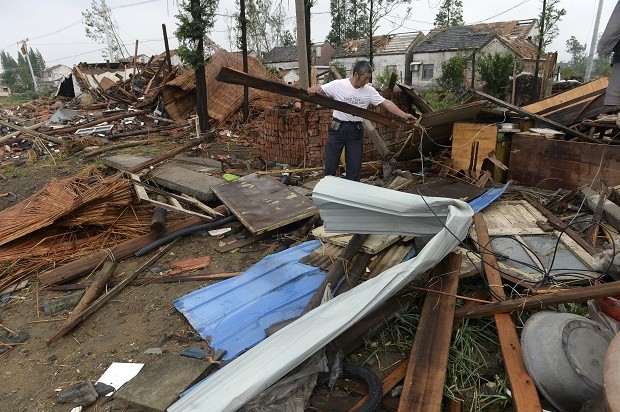
A man moves wood debris from a damaged structure in Funing county in Yancheng city in eastern China’s Jiangsu Province Friday, June 24, 2016. A tornado and hailstorm struck a densely populated area of farms and factories on the outskirts of an eastern Chinese city on Thursday, killing dozens of people and destroying buildings, smashing trees and flipping vehicles on their roofs. AP
YANCHENG, China — Rescuers in eastern China searched Friday for survivors of a tornado and hailstorm that killed at least 78 people as it swept over a city’s outskirts, destroying buildings, smashing trees and flipping vehicles on their roofs.
The tornado hit a densely populated area of farms and factories Thursday near the city of Yancheng in Jiangsu province, about 800 kilometers (500 miles) south of Beijing.
Nearly 500 people were injured, 200 of them critically, the official Xinhua News Agency reported. Roads were blocked with trees, downed power lines and other debris. Heavy rain and the possibility of further hailstorms and more tornadoes complicated rescue efforts, state broadcaster CCTV reported.
READ: Chinese state media say 51 killed by powerful tornado
On Friday, rescuers worked to carry injured villagers into ambulances and deliver food and water to others, Xinhua reported.
In badly hit Xintu village, survivors grieved over lost relatives and surveyed the damage wrought on their homes.
“The people inside ran outside but the wind was too strong so they couldn’t,” villager Wang Shuqing told an Associated Press reporter. “My family were all inside, they all died. The police then came and took the bodies out, I can’t bear it.”
The disaster has been declared a national-level emergency, and on a trip to Uzbekistan, Chinese President Xi Jinping ordered central government bodies to provide all necessary assistance.
Tents and other emergency supplies were already being sent from Beijing, CCTV said.
The network showed people carrying the injured to hospitals, cars and trucks lying upside down, street light poles snapped in half, and steel electricity pylons crumpled and lying on their side. Power and telephone communications were knocked out over a broad area.
“I heard the gales and ran upstairs to shut the windows,” Xinhua quoted Xie Litian, 62, as saying. “I had hardly reached the top of the stairs when I heard a boom and saw the entire wall with the windows on it torn away.”
The roof then collapsed as he raced downstairs, Xie said. After sheltering in a corner for 20 minutes, he emerged to find the neighborhood transformed into a wasteland. “It was like the end of the world,” he said.
Jiangsu is a coastal province north of Shanghai. Yancheng is an ancient city with more than 8 million people.
The Jiangsu provincial fire and rescue service provided no word on casualties. It said on its microblog that the storm was accompanied by hail. Crews were dispatched to evacuate workers and secure chemicals and other potentially dangerous items at a sprawling solar panel factory in a Yancheng suburb, it said. No chemical leaks been reported, CCTV said.
Photos showed a wrecked three-story school with large trees strewn on its playing field. Its windows had been blown out and its roof and upper floor torn off, along with those of numerous other buildings.
Bodies were shown lying in the open or buried in rubble. At least one hog farm was hit, its livestock covered in bricks and roofing material.
The reports said the tornado struck at about 2:30 p.m. and hit Funing and Sheyang counties on the city’s outskirts the hardest, with winds of up to 125 kph (78 mph).
Tornados occasionally strike southern China during the summer, but rarely with the scale of death and damage caused by the one on Thursday.
This year, southern and eastern China have experienced weeks of torrential rain and storms that have caused widespread flooding and dozens of casualties.
The southern part of the country is hit every year during the May-July monsoon season, but this rainy season has been particularly wet. Water levels in some major rivers have exceeded those of 1998, when China was hit by disastrous floods that affected 180 million people, according to state media reports.